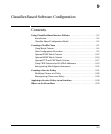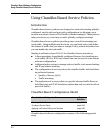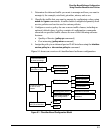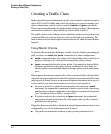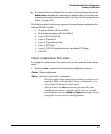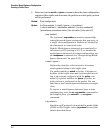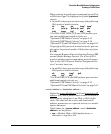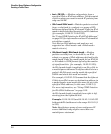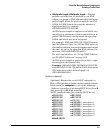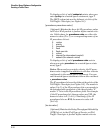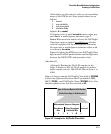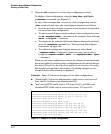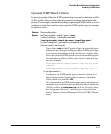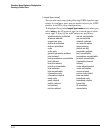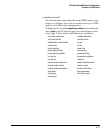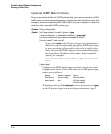
Classifier-Based Software Configuration
Creating a Traffic Class
• SAv6/prefix-length | DAv6/prefix-length — Matches
packets received from, or destined to, an IPv6
subnet or a group of IPv6 addresses defined by the
prefix length. Enter the prefix length for an IPv6
SA/DA in CIDR format by using the number of
significant bits; for example:
2001:db8:2620:212::01b4/64.
An IPv6 prefix-length is applied to an SA/DA in a
match/ignore statement to define which bits in a
packet’s SA/DA must exactly match the specified
SA/DA and which bits need not match.
For example, 2001:db8:2620:212::01b4/64 means
that the leftmost 64 bits in a 128-bit IPv6 source or
destination address in a packet header must match
the same bit set in the specified IPv6 address (in
this case, 2001:db8:2620:212::01b4).
For more information, see “Using CIDR Notation
for IPv4/IPv6 Addresses” on page 9-19.
An IPv6 prefix-length is applied from left to right,
starting from the leftmost bits.
Example: 2001:db8::0001:2620:a03:e102:127/64
and 2001:db8::1:244:17ff:feb6:d37d/64 both match
IPv6 addresses with a network prefix of
2001:db8:0000:0001.
[ ip-dscp codepoint ]
(Optional) Matches the six-bit DSCP codepoint in
IPv4 or IPv6 packets to further define match criteria.
Valid values for codepoint are one of the following:
- Numeric equivalent of a binary DSCP bit set from 0
(low priority) to 63 (high priority)
-ASCII standard name for a binary DSCP bit set:
af11 (001010) af42 (100100)
af12 (001100) af43 (100110)
af13 (001110) ef
(101110)
af21 (010010) cs1
(001000) = precedence 1
af22 (010100) cs2
(010000) = precedence 2
af23 (010110) cs3
(011000) = precedence 3
af31 (011010) cs4
(100000) = precedence 4
af32 (011100) cs5
(101000) = precedence 5
af33 (011110) cs6
(110000) = precedence 6
af41 (100010) cs7
(111000) = precedence 7
default
(000000)
9-9



